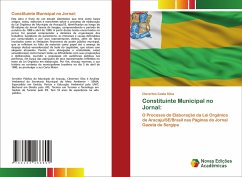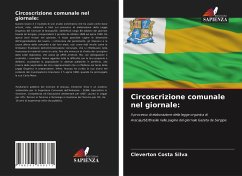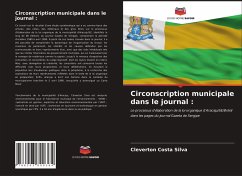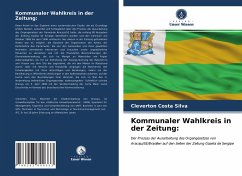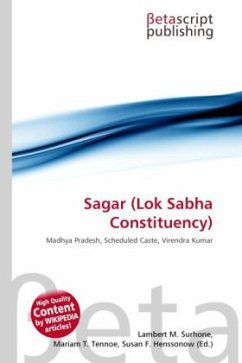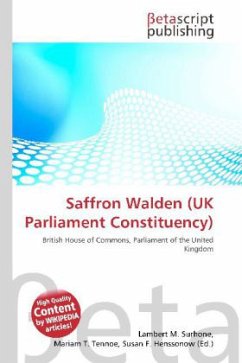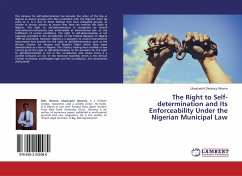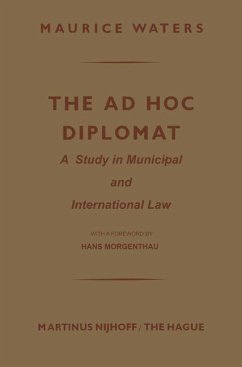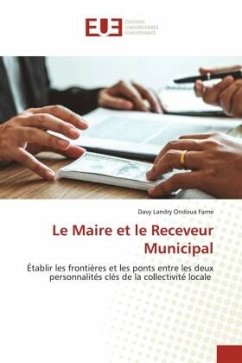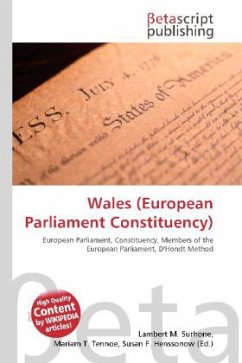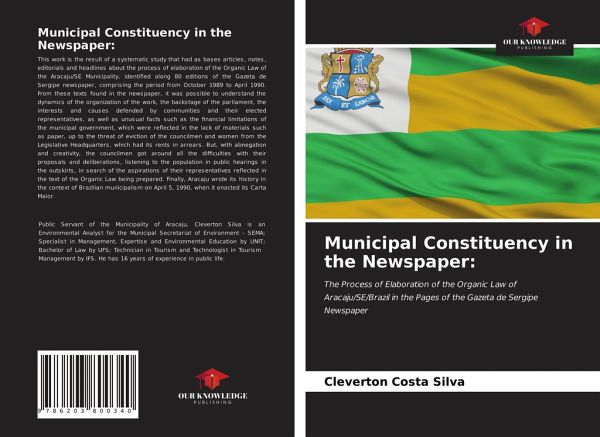
Municipal Constituency in the Newspaper:
The Process of Elaboration of the Organic Law of Aracaju/SE/Brazil in the Pages of the Gazeta de Sergipe Newspaper
Versandkostenfrei!
Versandfertig in 6-10 Tagen
27,99 €
inkl. MwSt.

PAYBACK Punkte
14 °P sammeln!
This work is the result of a systematic study that had as bases articles, notes, editorials and headlines about the process of elaboration of the Organic Law of the Aracaju/SE Municipality, identified along 80 editions of the Gazeta de Sergipe newspaper, comprising the period from October 1989 to April 1990. From these texts found in the newspaper, it was possible to understand the dynamics of the organization of the work, the backstage of the parliament, the interests and causes defended by communities and their elected representatives, as well as unusual facts such as the financial limitatio...
This work is the result of a systematic study that had as bases articles, notes, editorials and headlines about the process of elaboration of the Organic Law of the Aracaju/SE Municipality, identified along 80 editions of the Gazeta de Sergipe newspaper, comprising the period from October 1989 to April 1990. From these texts found in the newspaper, it was possible to understand the dynamics of the organization of the work, the backstage of the parliament, the interests and causes defended by communities and their elected representatives, as well as unusual facts such as the financial limitations of the municipal government, which were reflected in the lack of materials such as paper, up to the threat of eviction of the councilmen and women from the Legislative Headquarters, which had its rents in arrears. But, with abnegation and creativity, the councilmen got around all the difficulties with their proposals and deliberations, listening to the population in public hearings in theoutskirts, in search of the aspirations of their representatives reflected in the text of the Organic Law being prepared. Finally, Aracaju wrote its history in the context of Brazilian municipalism on April 5, 1990, when it enacted its Carta Maior.
This work is the result of a systematic study that had as bases articles, notes, editorials and headlines about the process of elaboration of the Organic Law of the Aracaju/SE Municipality, identified along 80 editions of the Gazeta de Sergipe newspaper, comprising the period from October 1989 to April 1990. From these texts found in the newspaper, it was possible to understand the dynamics of the organization of the work, the backstage of the parliament, the interests and causes defended by communities and their elected representatives, as well as unusual facts such as the financial limitations of the municipal government, which were reflected in the lack of materials such as paper, up to the threat of eviction of the councilmen and women from the Legislative Headquarters, which had its rents in arrears. But, with abnegation and creativity, the councilmen got around all the difficulties with their proposals and deliberations, listening to the population in public hearings in the outskirts, in search of the aspirations of their representatives reflected in the text of the Organic Law being prepared. Finally, Aracaju wrote its history in the context of Brazilian municipalism on April 5, 1990, when it enacted its Carta Maior.
This work is the result of a systematic study that had as bases articles, notes, editorials and headlines about the process of elaboration of the Organic Law of the Aracaju/SE Municipality, identified along 80 editions of the Gazeta de Sergipe newspaper, comprising the period from October 1989 to April 1990. From these texts found in the newspaper, it was possible to understand the dynamics of the organization of the work, the backstage of the parliament, the interests and causes defended by communities and their elected representatives, as well as unusual facts such as the financial limitations of the municipal government, which were reflected in the lack of materials such as paper, up to the threat of eviction of the councilmen and women from the Legislative Headquarters, which had its rents in arrears. But, with abnegation and creativity, the councilmen got around all the difficulties with their proposals and deliberations, listening to the population in public hearings in the outskirts, in search of the aspirations of their representatives reflected in the text of the Organic Law being prepared. Finally, Aracaju wrote its history in the context of Brazilian municipalism on April 5, 1990, when it enacted its Carta Maior.



